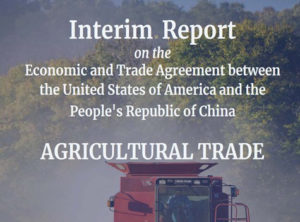 The Agricultural Retailers Association (ARA) has just released a study on the impacts of increased electric vehicle penetration on U.S. biofuels, agriculture and the economy. Proposals to ban internal combustion engine vehicles by 2035 and 2050 served as the economic models for the study, along with a base case provided by the U.S. Energy Information Administration’s Annual Energy Outlook.
The Agricultural Retailers Association (ARA) has just released a study on the impacts of increased electric vehicle penetration on U.S. biofuels, agriculture and the economy. Proposals to ban internal combustion engine vehicles by 2035 and 2050 served as the economic models for the study, along with a base case provided by the U.S. Energy Information Administration’s Annual Energy Outlook.
The study found that U.S. light-duty and freight vehicle consumption of ethanol and biodiesel could decline up to 90 percent to 1.1 billion gallons and up to 61 percent to 0.8 billion gallons, respectively.
Corn and soybean consumption could decrease by up to 2.0 billion bushels and up to 470 million bushels, respectively. Corn prices fall up to 50 percent to $1.74 per bushel, while soybean prices fall up to 44 percent to $4.92 per bushel.
Overall, U.S. net farm income would decrease by up to $27 billion due to a proposed ban.
This study makes clear that an internal combustion engine vehicle ban could devastate the agriculture community. Proposals that seek to rush this ban to 2035 have the most severe impacts, but any ban results in dramatic decreases in ethanol, biodiesel, corn and soybean prices, and demand for fertilizer and other agricultural products. These are burdens carried disproportionately by the agriculture community.
The study found that economic losses throughout the biofuels value chain range from $105 billion to $185 billion, and cumulative federal, state, and local tax revenues losses range from $39 billion to $69 billion through 2050.
Richard Gupton, ARA Senior Vice President Public Policy & Counsel, talks about the study in this interview.
ARA gas car ban study (4:21)

 St. Louis-based
St. Louis-based  Benson Hill leverages Cloud Biology®, a discipline combining the power of data science, machine learning and AI techniques with plant biology and genomics. CropOS™ is the platform that makes this discipline actionable, significantly accelerating the precision and speed of product development. Benson Hill’s technology platform and collaborations empower the creation of healthier and more sustainable feed, food and ingredient options that consumers are seeking, while also delivering strong crop performance that farmers demand.
Benson Hill leverages Cloud Biology®, a discipline combining the power of data science, machine learning and AI techniques with plant biology and genomics. CropOS™ is the platform that makes this discipline actionable, significantly accelerating the precision and speed of product development. Benson Hill’s technology platform and collaborations empower the creation of healthier and more sustainable feed, food and ingredient options that consumers are seeking, while also delivering strong crop performance that farmers demand.

 The
The  With a background of cotton ready for harvest,
With a background of cotton ready for harvest,  The 2020 Syngenta Virtual Media Summit officially kicked off Tuesday morning with a live event featuring Syngenta North America leaders.
The 2020 Syngenta Virtual Media Summit officially kicked off Tuesday morning with a live event featuring Syngenta North America leaders.



 Highlights in the report include:
Highlights in the report include: